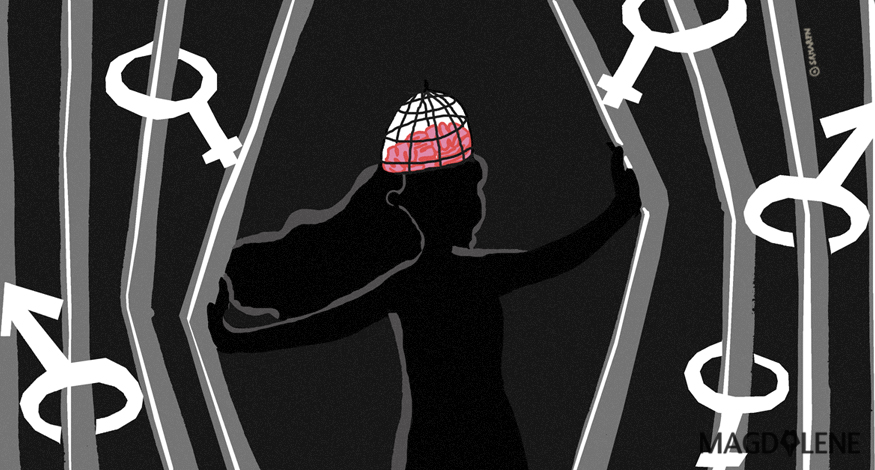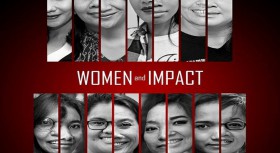Recently I visited Setu Babakan, a cultural center for the Betawi people, the ethnicity native to Jakarta, to watch lenong with my friend Firsta. Lenong is a comedy performance that is often used as a medium to tell stories and spread social messages, similar to the wayang shadow puppet show of the Javanese. It is interactive and is usually very relatable.
We found a seat right in front of the stage, but it wasn’t long wasn’t long into the show before we started to cringe. The play revolves around a family with a daughter, who one day gets raped by a gang leader. As it was a “family show” with kids in the audience, this particular scene wasn’t shown on stage. The actors’ delivered their lines from back stage – a few “please, don’t, sir!” and some lines showing the other gang members interpreting the cry for help as expression of pleasure.
The rapist in the story is apparently the son of a major thug and he brags to his parents about having just raped a girl. His father showed his pride, while his mother is ashamed. However, the latter was quickly reminded by his father that he, too, raped her a long time ago. Yes, this was supposed to be funny!
The plot thickens when the girl’s family comes to ask for the rapist’s responsibility. The solution? She is to marry her rapist. When the play ended, everyone applauded the show.
I had actually predicted this ending when earlier in the show Firsta asked me to guess how the “situation would be resolved.” Not that I believe that is how it should be, but, somehow, I knew that’s how rapes are addressed in Indonesia.
Still, I was left disturbed. I wasn’t sure whether what I had just seen was acceptable or whether it was bad. What was obvious, though, was that Firsta and I seemed to be the only people in the audience who cringed throughout the show. Also, I wasn’t sure whether what I had just seen was acceptable or bad.
Japanese theatre master and philosopher Tadashi Suzuki once said that to understand the social structure of a certain place, one must observe their theater. But, boy, did I have so many questions in my head. Most of all it made me question how many Indonesians, or Betawi people specifically, married their rapists? I also wondered whether I should talk to the scriptwriter.
I began to despise the cast and crew, but what was even sadder was that I dismissed the play as another example that people just didn’t know any better. Eventually, I asked a friend who knew the organizers of the event to pass my concern to them. She assured me that the message was delivered and that the committee would talk to the crew. But that was as far as I went.
A few months later I still had the play in my mind, when I consulted a friend of mine who was knowledgeable on the Indonesian culture. She told me that I had only looked at this from the perspective of Western feminism, instead of the Eastern culture. There are many practices in the Indonesian culture that do not conform to what is appropriate in the West when it comes to women’s empowerment and equality, she said. The women of Sasak Village, Lombok, are kidnapped into marriage, she said. Some of the people in the east of Lesser Sunda Island have to be impregnated before marriage to prove they can bear a child.
In the case of this Betawi play, rather than seeing it as right or wrong, she told me to perceive it as a different take on women’s empowerment. At the very least, marriage is a form of solution that doesn’t leave the victim carrying the burden alone, she said.
I don’t really have a conclusion to this. I’m still trying to find an ending that makes sense. Although what my smart friend said might be disturbing, she had a point. I’m still very open to any other perspective; I could really use it.
In my ideal world, the rapist would be imprisoned. The victim would look him in the eye and say “You took something from me, now I take something from you.” In my ideal world, the stage, with such a big audience, would advocate that rape victims should never be wedded to their rapist and the message will be disseminated to so many people who might still think otherwise.
In an ideal world, I would have known more about feminism in both East and West cultures, and be confident to take a stronger stand to this. Maybe I would have stood at the end of the show and shouted “Excuse me, that’s not how to end a rape case. May I speak to the writer, please.”
But for now, I’ll take what Tadashi has to say about the theatre, I’ll accept this phenomenon as part of the Betawi culture. It’s an ending that I can live with now, but with a note in red ink that the education of rape in our nation’s capital is still far from ideal and that we are still working to change it.







Comments